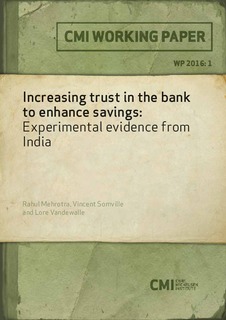Increasing trust in the bank to enhance savings: Experimental evidence from India
Original version
Bergen: Chr. Michelsen Institute (CMI Working Paper WP 2016:02)Abstract
Recent evidence highlights the importance of trust in explaining bank account savings. According to economic theory, repeated interactions can play a crucial role in shaping trust. We designed the first field experiment that tests whether increased interactions between clients and bankers influence a client's trust in bankers. We promoted interactions by randomly (i) opening accounts for the unbanked and (ii) making weekly payments on their accounts. At the end of these interventions, we measured trust by playing trust games between clients on the one hand, and their own local banker as well as an anonymous other banker on the other hand. The only intervention that has a signicant impact on the number of interactions is opening a bank account. It also greatly increases trust in the anonymous banker, but not in their own banker. Next, we investigate the importance of trust for account savings. We find a strong positive correlation between the clients' trust in their own banker and savings in the account, but their trust in another banker does not correlate with savings. From the decomposition of trust in its different determinants, we learn that expected trustworthiness matters most in explaining savings, while there is a minor role for social preferences and no role for risk attitudes. We conclude that the personalized client-banker relationships are crucial, but not malleable. Strategies which can deal with the expected trustworthiness - such as providing access to an ATM, or to a denser network of local bankers - might promote bank account savings.
